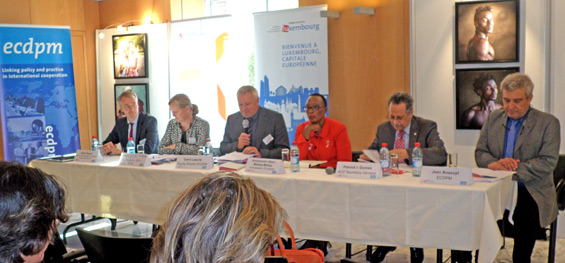Debate examines ACP-EU cooperation in the post-2015 era

Brussels, 6 October 2015/ ACP: A full day of discussions dedicated to how “fit for purpose” the ACP-EU framework is in terms of delivering international cooperation objectives beyond 2015, was organised by the Grand Duchy of Luxembourg, which holds the Presidency of the Council of the European Union, and the European Centre for Development Policy Management (ECDPM) on 30 September.
The seminar, attended by experts, diplomats, representatives of international organisations and various stakeholders in international development, featured the presentation of preliminary results of a political economy analysis of the ACP-EU partnership conducted by the ECDPM. The full report is expected in November 2015.
Interactive sessions focused on taking stock of the ACP-EU Cotonou Partnership Agreement (signed in 2000 and renewed in 2005 and 2010), rethinking the partnership using a political economy lens, and exploring the building blocks for a future partnership framework. ACP Secretary General H.E. Dr Patrick Gomes, as well as the Chair of the ACP Committee of Ambassadors H.E Mrs Mpeo Mahase-Moiloa contributed to the discussions as panellists, alongside international relations experts Simon Maxwell (Overseas Development Institute), Keith Nurse (University of the West Indies), civil society rep Gina Wharton (Concord Cotonou Working Group), Koos Richelle (Former DG European Commission), as well as EU officials Koen Doens (DG DEVCO, European Commission) and Kristin Peyron (European External Action Service), amongst others.
Lively debates revealed a range of views which underscored the importance of the ACP-EU partnership in global governance, but also of adapting the framework to new realities in the international arena. Participants pointed out the need to rationalise the role of the ACP vis-à-vis continental or regional level organisations, and to better exploit the opportunities provided within the ACP-EU agreement. South-South and Triangular Cooperation, especially in terms of innovative approaches to delivering on the post-2015 Sustainable Development Goals (SDGs), was cited as a niche area where the ACP and ACP-EU frameworks have a comparative advantage and potential to make an impact. Civil society organisations and business sector were highlighted as key stakeholders that should be included and more actively engaged in the discussions.
Towards a new partnership
The seminar was held days before the High Representative of the European Union for Foreign Affairs and Security Policy and Vice-President of the European Commission Ms. Frederica Mogherini and the European Commissioner for Development Mr. Neven Mimica jointly announced the launch of public consultations on the future of the partnership between the European Union and African, Caribbean and Pacific (ACP) countries after 2020, when the current ACP-EU Cotonou Agreement will expire.
The ACP Group has also been undergoing internal reflections on the issue, with the report by the Ambassadorial Working Group on the Future of the ACP Group approved by the ACP Council of Ministers in December 2014, and an Eminent Persons Group led by former Nigerian President Olusegun Obasanjo due to submit recommendations on the future orientation of the 79-country grouping to ACP Heads of State and Government in May 2016. The ACP Group aims to reposition itself as a more relevant and effective organisation, deepening its partnership with the EU while also diversifying relations to include other major players.
The partnership between Europe and the ACP Group of countries dates back to 1974, with the signing of the Lomé Convention, which was a trade and aid agreement that followed previous partnerships with African states and Europe’s overseas territories. In 2000, the scope of the Lomé Convention and its revisions were broadened to include political dialogue, embodied in the ACP-EU Cotonou Partnership Agreement which would last for 20 years.
Due to expire in 2020, both parties are undergoing serious reflection as to what kind of framework should follow, that will maximise the effectiveness of the cooperation in helping ACP countries achieve sustainable development while contributing to enhanced global governance.
(Photo: One of the sessions at the seminar hosted by the Permanent Representation of Luxembourg to the EU and the ECDPM.)
– ACP Press Office
